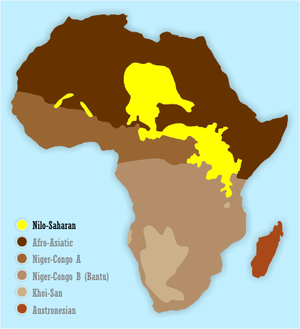Nilo-Saharan languages
| Nilo-Saharan | |
|---|---|
| (undemonstrated) | |
| Geographic distribution: |
Central and East Africa |
| Linguistic classification: | One of the world's primary language families |
| Subdivisions: | |
| ISO 639-2 / 5: | |
| Glottolog: | None |

Map showing the distribution of Nilo-Saharan languages
|
|
The Nilo-Saharan languages are a proposed family of African languages spoken by some 50–60 million Nilotic people, mainly in the upper parts of the Chari and Nile rivers, including historic Nubia, north of where the two tributaries of the Nile meet. The languages extend through 17 nations in the northern half of Africa: from Algeria to Benin in west; from Libya to the Democratic Republic of the Congo in the center; and from Egypt to Tanzania in the east.
As indicated by its hyphenated name, Nilo-Saharan is a family of the African interior, including the greater Nile basin and the central Sahara desert. Eight of its proposed constituent divisions (excluding Kunama, Kuliak, and Songhay) are found in the modern two nations of Sudan and South Sudan, through which the Nile River flows.
In his 1963 book The Languages of Africa, Joseph Greenberg named the group and argued it was a genetic family. It contains the languages not included in the Niger–Congo, Afroasiatic, or Khoisan groups. It has not been demonstrated that the Nilo-Saharan languages constitute a valid genetic grouping, and linguists have generally seen the phylum as "Greenberg's wastebasket", into which he placed all the otherwise unaffiliated non-click languages of Africa. Its supporters accept that it is a challenging proposal to demonstrate, but contend that it looks more promising the more work is done.
...
Wikipedia
